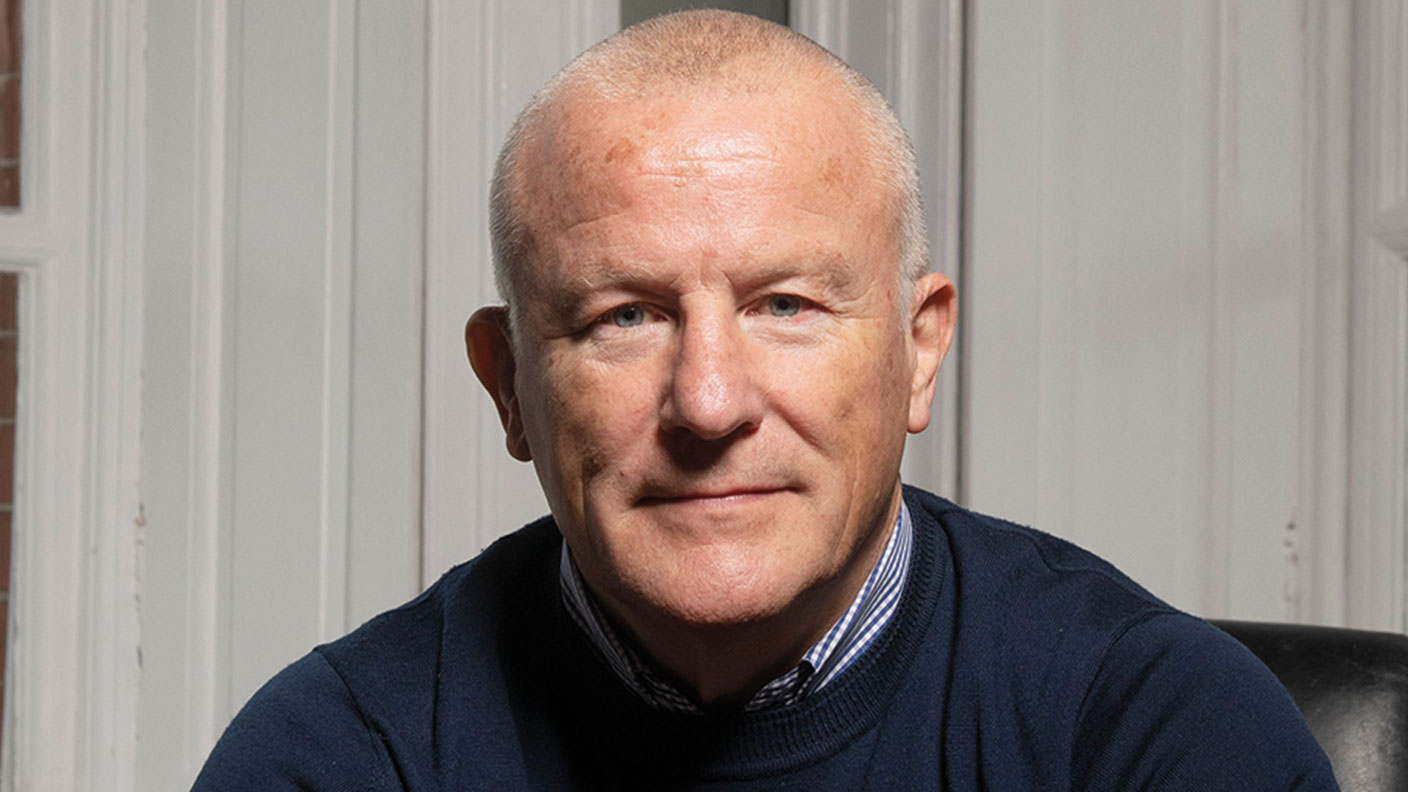Why you still shouldn’t touch Woodford Patient Capital with a bargepole
The price of the Woodford Patient Capital investment trust has fallen so far that you may think it looks like a bargain buy. Think again, says John Stepek.

Get the latest financial news, insights and expert analysis from our award-winning MoneyWeek team, to help you understand what really matters when it comes to your finances.
You are now subscribed
Your newsletter sign-up was successful
Want to add more newsletters?

Twice daily
MoneyWeek
Get the latest financial news, insights and expert analysis from our award-winning MoneyWeek team, to help you understand what really matters when it comes to your finances.

Four times a week
Look After My Bills
Sign up to our free money-saving newsletter, filled with the latest news and expert advice to help you find the best tips and deals for managing your bills. Start saving today!

A feature in both economics and investing that is often poorly appreciated is the idea of opportunity cost.
There is always a wide range of things that you can do with your time and your money.
When you choose to do one, you forgo the others.
MoneyWeek
Subscribe to MoneyWeek today and get your first six magazine issues absolutely FREE

Sign up to Money Morning
Don't miss the latest investment and personal finances news, market analysis, plus money-saving tips with our free twice-daily newsletter
Don't miss the latest investment and personal finances news, market analysis, plus money-saving tips with our free twice-daily newsletter
So being a successful investor starts with making sure that you make good choices.
Today I want to take a look at what the latest news on the Neil Woodford front can teach us about opportunity cost and the value of your time...
Ignore the siren song of the apparent big-name bargain
Woodford Patient Capital Trust reported its first-half results today.
Neil Woodford, most of you will no doubt remember, is the famous fund manager who had to shutter his open-ended fund, Woodford Equity Income, all the way back in June. Since then, investors haven't been able to take their money out of his fund.
Patient Capital holds many of the same stocks as the income fund. The difference is that Patient Capital is an investment trust, so investors there are able to evacuate by selling shares in the trust on the stock exchange. So the share price has slid heavily as a result of Woodford's woes.
One big problem is that a lot of the unlisted, illiquid companies in Woodford's open-ended fund are simply not worth what he thought they were worth. Another problem is that many had relied on him for future funding, which he now can't give them. A final problem is that even if these companies are good, people assume that Woodford is under pressure to sell and they therefore have no reason to pay full value.
All of these things have hit the net asset value (NAV) of the trust. This is the value of the underlying portfolio, as opposed to the market capitalisation of the trust itself.
The trust now trades at a discount to NAV of about 35%. In other words, if the current NAV is accurate, then you can pay about 65p for a bucket full of assets worth £1.
That sounds very tempting, doesn't it?
Let's explain why you shouldn't bother.
Here's why you shouldn't waste your time
Patient Capital Trust is one of those siren stocks that often seduces small investors, only to dash their cash on the rocks.
It's high profile. The share price has fallen massively. It's ostensibly cheap, trading at a huge discount to NAV. There's a sense of expectation that at some point, this stock must turn around, and that if you get in at the right time, you'll make a killing.
But stop and think for a moment. Of all the potentially attractive stocks and investment trusts out there, is doing the legwork on this one really a good use of your time?
As I said earlier always remember to factor in opportunity cost. There are always other things that you can do with your time and your money. Remember that when you choose one, you forgo the others.
So let me talk you through why I think spending your time and money on Patient Capital right now is a waste of your time.
Let's say we want to invest in Patient Capital. Here's what we'd have to do to be comfortable with the idea.
We already know we can't trust the NAV. The NAV fell by 26% in the year to 30 June 2019 alone. And it's fallen further since then (from 72p a share to 65p so another 10%, give or take). So who knows what might happen to it next?
First, I don't know exactly what's in the Patient Capital Trust portfolio right now. So before I considered investing in it, I'd have to get a good idea of what it's holding. That's a lot of holdings to go through, even if it's just the top 20.
Second, I'd then have to accept the fact that even if I understand what these stocks do (cold fusion?), I have very few ways of telling whether the stuff in the portfolio is worth anything like the current stated valuations. I don't know if the business models work. Even if they do, I don't know if the eventual ownership structures and financing models are actually going to turn out to be shareholder friendly.
That's a lot of work. The good news is that I can shortcut the process, and decide that it would be a waste of my time, by looking at one fairly simple point about Patient Capital.
It is abundantly clear that those who run the trust are not on top of this situation yet, because Woodford is still managing the portfolio. (For those who aren't clear on the way investment trusts work the board of an investment trust is there to protect the interests of shareholders. That can include firing the manager of the fund if necessary).
Few, if any, British fund managers, have ever messed up on the scale and to the extent that Woodford has. And to add insult to injury, Woodford sold £1 million-worth of shares in the trust in July to pay a tax bill and didn't even tell the board he was going to do so. Indeed, it took him three weeks to tell them. And that was about 60% of his overall holding.
Talk about a slap in the face for all involved. Not least the shareholders.
We are nowhere near turnaround time for this trust
The fact that they are struggling to get rid of him suggests two things to me. One, they are overly tied to Woodford. He has dominated the board for so long that they are struggling to behave independently. (To be clear, I'm not suggesting anything underhand here purely the problem of having a big personality surrounded by yes' executives).
Two, the lack of a big queue to come and take over the trust suggests to me that external managers have no more confidence in the quality of the assets it holds than I do.
That leaves wide a couple of unpleasant possibilities. One, a new manager could come in and write down the portfolio even further. "Kitchen-sinking" might represent an opportunity but before that we could see a much bigger drop in the NAV.
Two, the other option would be to consider winding up the trust. Again, it's hard to see how a wind-up could happen without more disappointments on the NAV front.
In short, we are nowhere near the turnaround point for this trust. If someone else decides to take on this lame duck, then I might believe that it's worth another look. But until then I wouldn't waste your time and certainly not your money on even giving it a second glance.
Oh and a quick thing before I go one of the discussion topics at our conference in November is "How to avoid a Woodford" it's all about making sure that your money doesn't get tied up in a fund that then stops you from getting your money back out. It will be vital viewing for anyone with their money invested in funds book your ticket now and see the rest of the jam-packed agenda here.
Get the latest financial news, insights and expert analysis from our award-winning MoneyWeek team, to help you understand what really matters when it comes to your finances.

-
 How should a good Catholic invest? Like the Vatican’s new stock index, it seems
How should a good Catholic invest? Like the Vatican’s new stock index, it seemsThe Vatican Bank has launched its first-ever stock index, championing companies that align with “Catholic principles”. But how well would it perform?
-
 The most single-friendly areas to buy a property
The most single-friendly areas to buy a propertyThere can be a single premium when it comes to getting on the property ladder but Zoopla has identified parts of the UK that remain affordable if you aren’t coupled-up
-
 Neil Woodford’s back – but has he really learned anything?
Neil Woodford’s back – but has he really learned anything?Opinion Disgraced fund manager Neil Woodford is planning a comeback. But he doesn’t seem to have learned much from his many mistakes. So why would anyone invest with him now?
-
 Neil Woodford’s back – but sometimes sorry isn’t enough
Neil Woodford’s back – but sometimes sorry isn’t enoughAdvice Neil Woodford’s funds blew up in 2019. Now he is on the comeback trail. But his apologies are unconvincing.
-
 Woodford investor? Your first payment is coming soon
Woodford investor? Your first payment is coming soonNews Private investors left stranded by the collapse of the Woodford Equity Income fund will soon be getting at least some of their money back. But they will have to wait a while longer to see how much more – if any – they will receive.
-
 Neil Woodford continues to cast a shadow over his successor at Invesco
Neil Woodford continues to cast a shadow over his successor at InvescoFeatures Mark Barnett, former star manager Neil Woodford’s successor at Invesco, has applied the same formula, and is struggling.
-
 Is it time to buy Patient Capital Trust?
Is it time to buy Patient Capital Trust?Features Neil Woodford’s Patient Capital Trust has been taken over by asset manager Schroders. The share price has surged - but should you buy in? John Stepek looks at the trust’s prospects.
-
 Neil Woodford: no silver lining for his investors
Neil Woodford: no silver lining for his investorsEditor's letter Neil Woodford made every mistake it is possible to make as a money manager. And his investors have been stiffed. But however wrong it all went, Woodford never stopped taking the fees.
-
 Woodford believed his own hype – now his investors are paying the price
Woodford believed his own hype – now his investors are paying the priceFeatures Neil Woodford was once one of the brightest stars in Britain’s investment firmament. Then he came crashing down to earth. John Stepek explains what went wrong.
-
 Woodford’s empire collapses – what happens to his investors now?
Woodford’s empire collapses – what happens to his investors now?Features With Neil Woodford getting his marching orders and his funds being shut down, John Stepek explains what it means for his former empire, and for those with money locked in.